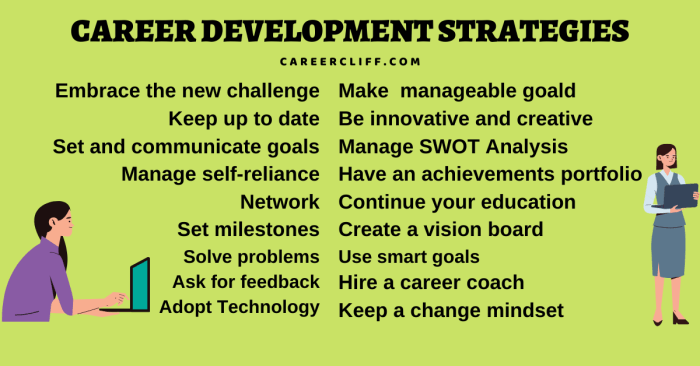Career Growth Strategies, let’s dive into the key tactics to boost your professional path like a boss. From defining your goals to overcoming obstacles, we’ve got you covered.
Unleash the power of strategic planning and development to take your career to new heights.
Importance of Career Growth Strategies

Having well-defined career growth strategies is crucial for individuals looking to advance in their professional lives. These strategies provide a roadmap for setting goals, making progress, and ultimately achieving success in one’s career.
Career growth strategies can significantly impact an individual’s professional development by helping them identify their strengths, weaknesses, opportunities, and threats. By understanding these factors, individuals can make informed decisions about their career path, such as pursuing additional education, seeking out mentorship, or taking on new challenges.
Examples of Successful Professionals
- Elon Musk: The visionary entrepreneur behind companies like Tesla and SpaceX, Musk has demonstrated the importance of setting ambitious goals and constantly seeking opportunities for growth and innovation.
- Indra Nooyi: As the former CEO of PepsiCo, Nooyi’s strategic approach to career advancement and her focus on continuous learning and development have been key factors in her success.
- Oprah Winfrey: A media mogul known for her resilience and determination, Winfrey’s career growth strategies have centered around authenticity, self-improvement, and leveraging her platform for positive change.
Types of Career Growth Strategies
When it comes to advancing in your career, there are various strategies you can employ to help you reach your goals. Some of the most common types of career growth strategies include skill development, networking, and goal-setting.
Skill Development, Career Growth Strategies
One effective way to advance in your career is by continuously developing and improving your skills. This can involve taking courses, attending workshops, or seeking mentorship opportunities to enhance your expertise in a particular area.
Networking
Building a strong professional network is essential for career growth. By connecting with others in your industry, attending networking events, and maintaining relationships with colleagues, you can open up new opportunities for advancement and collaboration.
Goal-Setting
Setting clear and achievable goals is crucial for career growth. By establishing milestones and timelines for your professional development, you can stay focused and motivated to work towards your objectives.
Short-term versus Long-term Strategies
Short-term career growth strategies typically focus on immediate actions that can help you make quick progress in your current role or position. On the other hand, long-term strategies involve planning for future career advancements and may require more time and effort to achieve.
Short-term Strategies Examples
- Completing a short online course to improve a specific skill.
- Attending a networking event to meet potential mentors or collaborators.
Long-term Strategies Examples
- Pursuing a higher education degree to qualify for advanced roles.
- Engaging in a long-term mentorship program to guide your career growth over time.
Impact of Strategies on Career Advancement
Implementing specific career growth strategies can have a significant impact on your professional development and advancement. For example, individuals who focus on skill development often find themselves qualified for higher-paying positions or leadership roles within their organizations. Networking can lead to new job opportunities or collaborations that propel career growth, while goal-setting helps individuals stay on track and achieve their career aspirations.
Implementing Career Growth Strategies
When it comes to implementing career growth strategies, it’s crucial to have a personalized plan that aligns with your goals and aspirations. Flexibility and adaptability are also key factors in ensuring successful implementation.
Creating a Personalized Career Growth Plan
Creating a personalized career growth plan involves the following steps:
- Evaluate your current skills and strengths.
- Identify areas for improvement and growth.
- Set specific, measurable, achievable, relevant, and time-bound (SMART) goals.
- Develop a timeline and action steps to achieve your goals.
- Regularly review and adjust your plan as needed.
Aligning Career Growth Strategies with Goals
It’s important to align your career growth strategies with your individual goals and aspirations to ensure that you are working towards what truly matters to you. Here are some tips:
- Reflect on your long-term career objectives.
- Consider how each strategy contributes to your overall goals.
- Make sure your actions are in line with your values and interests.
- Seek feedback from mentors or career advisors to validate your alignment.
Importance of Flexibility and Adaptability
Flexibility and adaptability are crucial when implementing career growth strategies because:
- Market demands and job requirements are constantly evolving.
- New opportunities may arise that require a shift in your plans.
- Being adaptable allows you to pivot and adjust your strategies when needed.
- Flexibility helps you embrace change and take advantage of unforeseen circumstances.
Overcoming Challenges in Career Growth

When it comes to implementing career growth strategies, individuals often face various challenges that can hinder their progress. However, with the right mindset and approach, these obstacles can be overcome to achieve success in career advancement.
Lack of Skills and Qualifications
One common challenge individuals face is the lack of necessary skills and qualifications to move forward in their careers. This can be addressed by investing in continuous learning and professional development opportunities. Taking courses, attending workshops, and seeking mentorship can help individuals acquire the skills needed to progress.
Limited Networking Opportunities
Networking plays a crucial role in career growth, but many individuals struggle with limited opportunities to connect with professionals in their field. To overcome this challenge, individuals can leverage social media platforms, attend industry events, and join professional organizations to expand their network. Building meaningful relationships and connections can open doors to new opportunities for career advancement.
Work-Life Balance
Balancing work responsibilities with personal life can be a significant challenge for many individuals pursuing career growth. It is important to prioritize self-care, set boundaries, and communicate effectively with employers to maintain a healthy work-life balance. By taking care of their well-being, individuals can perform better at work and stay motivated to achieve their career goals.
Handling Rejection and Setbacks
Rejection and setbacks are inevitable in any career journey, but they can be discouraging for individuals striving for growth. To overcome this challenge, it is essential to stay resilient, learn from failures, and adapt to new situations. Seeking feedback, staying positive, and staying focused on long-term goals can help individuals navigate through setbacks and continue moving forward in their careers.
